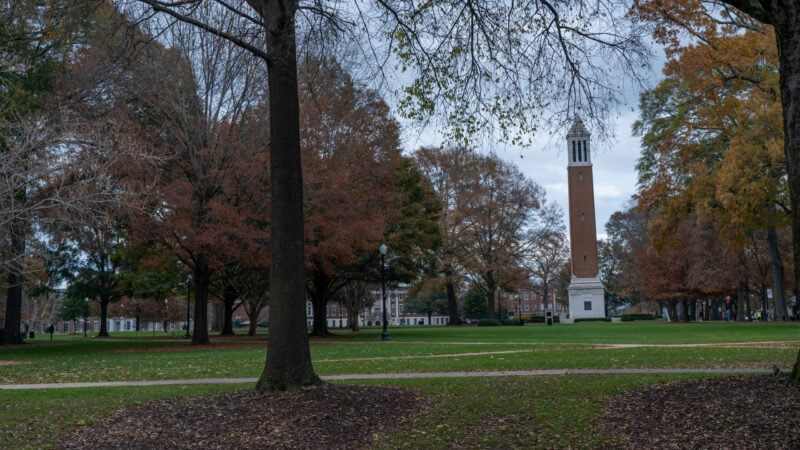Federal judge refuses to block Alabama law banning DEI initiatives in public schools
A federal judge on Wednesday declined a request to block an Alabama law that bans diversity, equity and inclusion initiatives in public schools and the teaching of what Republican lawmakers dubbed “divisive concepts” related to race and gender.
U.S. District Judge David Proctor wrote that University of Alabama students and professors who filed a lawsuit challenging the law as unconstitutional did not meet the legal burden required for a preliminary injunction, which he called “an extraordinary and drastic remedy.” The civil lawsuit challenging the statute will go forward, but the law will remain in place while it does.
The Alabama measure, which took effect Oct. 1, is part of a wave of proposals from Republican lawmakers across the country taking aim at DEI programs on college campuses.
The Alabama law prohibits public schools from funding or sponsoring any DEI program. It also prohibits schools from requiring students to assent to eight “divisive concepts” including that fault, blame or bias should be assigned to a race or sex or that any person should acknowledge a sense of guilt, complicity or a need to apologize because of their race, sex or national origin.
Six professors and students at the University of Alabama filed a lawsuit arguing that the law violates the First Amendment by placing viewpoint-based restrictions on what educators teach. The lawsuit also said the law unconstitutionally targets Black students because it limits programs that benefit them.
Professors said they had altered what they taught in their classes in the wake of the law and the university’s guidance about it. A professor said he reduced coverage of the Black Power movement, the Black Lives Matter movement and the white nationalist movement in the wake of the law. Another said five students had made complaints suggesting that the interdisciplinary honors program she administered had potential conflicts with the new legislation.
The university also shuttered designated spaces for the Black Student Union and a resource center for LGBTQ+ students in the wake of the law.
Proctor wrote that a professor’s academic freedom does not override a university’s decisions about the content of classroom instruction.
“Importantly, SB 129 does not banish all teaching or discussion of these concepts from campus or, for that matter, even from the classroom,” Proctor wrote. “To the contrary, it expressly permits classroom instruction that includes ‘discussion’ of the listed concepts so long as the ‘instruction is given in an objective manner without endorsement’ of the concepts.”
He added that the law appears to give notice about what is a violation. For example, he said a professor could not “indoctrinate” students to believe that racial health disparities were the fault of one race of people but could still discuss the role of racism in health disparities.
“If, alternatively, the theory she teaches about is that there is empirical evidence that racism may be a cause for health disparities, or if she frames such teaching as merely a theory, she would not violate SB 129,” Proctor wrote.
Will Creeley, legal director of the Foundation for Individual Rights and Expression, a nonpartisan First Amendment group, criticized the decision as dangerous and at odds with decades of Supreme Court precedent on academic freedom.
“Academic freedom protects the search for knowledge and truth from political pressure. That’s the whole point,” Creeley wrote in a statement. “Faculty are hired to share and hone their expertise in a given field of study, not to read from a government script.”
Supreme Court appears split in tax foreclosure case
At issue is whether a county can seize homeowners' residence for unpaid property taxes and sell the house at auction for less than the homeowners would get if they put their home on the market themselves.
Top House Dem wants Justice Department to explain missing Trump-related Epstein files
After NPR reporting revealed dozens of pages of Epstein files related to President Trump appear to be missing from the public record, a top House Democrat wants to know why.
ICE won’t be at polling places this year, a Trump DHS official promises
In a call with top state voting officials, a Department of Homeland Security official stated unequivocally that immigration agents would not be patrolling polling places during this year's midterms.
Surgeon general nominee Means questioned about vaccines, birth control and financial conflicts
During a confirmation hearing, senators asked Dr. Casey Means about her current positions and her past statements on a range of public health issues.
Rock & Roll Hall of Fame 2026 shortlist includes Lauryn Hill, Shakira and Wu-Tang Clan
The shortlist also includes a 1990s pop diva, heavy metal pioneers and a legendary R&B singer and producer.
This novel about family drama is so good you may want to re-read it immediately
Allegra Goodman's new novel is called This Is Not About Us, but critic Maureen Corrigan says that title is coy: Readers are bound to see aspects of themselves and their families in these pages.








